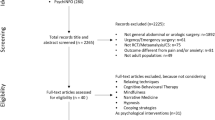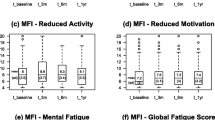Abstract
Background
Fatigue is one of the main complaints after surgery and may last longer than physical symptoms. It prevents return to normal function and activity. Relaxation interventions, performed prior to abdominal surgery, have been shown to reduce pain, wound erythema, and systemic cortisol levels. However, there is a lack of data on the impact of this intervention on patient well-being, functional recovery, activities of daily living, and fatigue after discharge from hospital.
Methods
The study was a randomised single-blinded trial. Patients who were to undergo elective laparoscopic cholecystectomy for any indication between April 2008 and May 2010 were screened for inclusion. Those in the intervention group attended a standardised 45 min relaxation session with a health psychologist and were given relaxation exercise CDs to take home. The control group did not have the intervention. Patients were followed for 30 days. Fatigue was measured using the identity-consequence fatigue scale.
Results
Seventy-five patients were randomised. Fifteen patients were excluded after randomization for various reasons; hence, 60 patients were followed up and analysed. Both groups had similar fatigue at baseline. There was improved fatigue and consequence of fatigue on postoperative day 30 in the intervention group. There was no difference in fatigue at any other time point postoperatively.
Conclusion
This was the first interventional study targeting fatigue after laparoscopic cholecystectomy by using a brief psychological relaxation intervention. It has shown a reduction of fatigue and impact of fatigue at 30 days postoperatively in the intervention group.



Similar content being viewed by others
References
Worster B, Holmes S (2008) The preoperative experience of patients undergoing surgery for colorectal cancer: a phenomenological study. Eur J Oncol Nurs 12(5):418–424
Worster B, Holmes S (2009) A phenomenological study of the postoperative experiences of patients undergoing surgery for colorectal cancer. Eur J Oncol Nurs 13(5):315–322
Kiecolt-Glaser JK, Page GG, Marucha PT, MacCallum RC, Glaser R (1998) Psychological influences on surgical recovery. Perspectives from psychoneuroimmunology. Am Psychol 53(11):1209–1218
Rubin GJ, Cleare A, Hotopf M (2004) Psychological factors in postoperative fatigue. Psychosom Med 66(6):959–964
Rubin GJ, Hardy R, Hotopf M (2004) A systematic review and meta-analysis of the incidence and severity of postoperative fatigue. J Psychosom Res 57(3):317–326
Zargar-Shoshtari K, Hill AG (2009) Postoperative fatigue: a review. World J Surg 33(4):738–745
Tsunoda A, Nakao K, Hiratsuka K, Tsunoda Y, Kusano M (2007) Prospective analysis of quality of life in the first year after colorectal cancer surgery. Acta Oncol 46(1):77–82
Wilson TR, Alexander DJ (2008) Clinical and non-clinical factors influencing postoperative health-related quality of life in patients with colorectal cancer. Br J Surg 95(11):1408–1415
Walker LG, Walker MB, Ogston K, Heys SD, Ah-See AK, Miller ID, Hutcheon AW, Sarkar TK, Eremin O (1999) Psychological, clinical and pathological effects of relaxation training and guided imagery during primary chemotherapy. Br J Cancer 80(1–2):262–268
Syrjala KL, Donaldson GW, Davis MW, Kippes ME, Carr JE (1995) Relaxation and imagery and cognitive-behavioral training reduce pain during cancer treatment: a controlled clinical trial. Pain 63(2):189–198
Devine EC (1992) Effects of psychoeducational care for adult surgical patients: a meta-analysis of 191 studies. Patient Educ Couns 19(2):129–142
Hattan J, King L, Griffiths P (2002) The impact of foot massage and guided relaxation following cardiac surgery: a randomized controlled trial. J Adv Nurs 37(2):199–207
Sahler OJ, Hunter BC, Liesveld JL (2003) The effect of using music therapy with relaxation imagery in the management of patients undergoing bone marrow transplantation: a pilot feasibility study. Altern Ther Health Med 9(6):70–74
Holden-Lund C (1988) Effects of relaxation with guided imagery on surgical stress and wound healing. Res Nurs Health 11(4):235–244
Good M, Stanton-Hicks M, Grass JA, Cranston Anderson G, Choi C, Schoolmeesters LJ, Salman A (1999) Relief of postoperative pain with jaw relaxation, music and their combination. Pain 81(1–2):163–172
Moher D, Schulz KF, Altman DG (2001) The CONSORT statement: revised recommendations for improving the quality of reports of parallel-group randomised trials. Lancet 357(9263):1191–1194
Paddison JS, Booth RJ, Hill AG, Cameron LD (2006) Comprehensive assessment of peri-operative fatigue: development of the identity-consequence fatigue scale. J Psychosom Res 60(6):615–622
Faul F, Erdfelder E, Lang AG, Buchner A (2007) G*Power 3: a flexible statistical power analysis program for the social, behavioral, and biomedical sciences. Behav Res Methods 39(2):175–191
Leserman J, Stuart EM, Mamish ME, Benson H (1989) The efficacy of the relaxation response in preparing for cardiac surgery. Behav Med 15(3):111–117
Ridgeway V, Mathews A (1982) Psychological preparation for surgery: a comparison of methods. Br J Clin Psychol 21(Pt 4):271–280
Haase O, Schwenk W, Hermann C, Muller JM (2005) Guided imagery and relaxation in conventional colorectal resections: a randomized, controlled, partially blinded trial. Dis Colon Rectum 48(10):1955–1963
Peerbhoy D, Keane P, Maciver K, Shenkin A, Hall GM, Salmon P (1999) The systematic assessment of short-term functional recovery after major joint arthroplasty. J Qual Clin Pract 19(3):165–171
Salmon P, Hall GM (1997) A theory of postoperative fatigue: an interaction of biological, psychological, and social processes. Pharmacol Biochem Behav 56(4):623–628
Christensen T, Nygaard E, Stage JG, Kehlet H (1990) Skeletal muscle enzyme activities and metabolic substrates during exercise in patients with postoperative fatigue. Br J Surg 77(3):312–315
Christensen T, Bendix T, Kehlet H (1982) Fatigue and cardiorespiratory function following abdominal surgery. Br J Surg 69(7):417–419
Paddison JS, Booth RJ, Fuchs D, Hill AG (2008) Peritoneal inflammation and fatigue experiences following colorectal surgery: a pilot study. Psychoneuroendocrinology 33(4):446–454
Zargar-Shoshtari K, Sammour T, Kahokehr A, Connolly AB, Hill AG (2009) Randomized clinical trial of the effect of glucocorticoids on peritoneal inflammation and postoperative recovery after colectomy. Br J Surg 96(11):1253–1261
Kahokehr A, Sammour T, Zargar-Shoshtari K, Taylor M, Hill AG (2010) Intraperitoneal local anesthetic improves recovery after colectomy: a double blind randomised controlled trial. ANZ J Surg 80S1:A15
Bisgaard T, Klarskov B, Rosenberg J, Kehlet H (2001) Factors determining convalescence after uncomplicated laparoscopic cholecystectomy. Arch Surg 136(8):917–921
Acknowledgment
The authors thank Janine Thomas, Iris Fontanilla, Maria Vitas, and Lisa Thompson for their assistance in this study. This study was funded by a Health Research Council of New Zealand Grant 07/259.
Disclosures
Arman Kahokehr, Elizabeth Broadbent, Benjamin Wheeler, Tarik Sammour, and Andrew Hill have no conflicts of interest or financial ties to disclose.
Author information
Authors and Affiliations
Corresponding author
Rights and permissions
About this article
Cite this article
Kahokehr, A., Broadbent, E., Wheeler, B.R.L. et al. The effect of perioperative psychological intervention on fatigue after laparoscopic cholecystectomy: a randomized controlled trial. Surg Endosc 26, 1730–1736 (2012). https://doi.org/10.1007/s00464-011-2101-7
Received:
Accepted:
Published:
Issue Date:
DOI: https://doi.org/10.1007/s00464-011-2101-7




